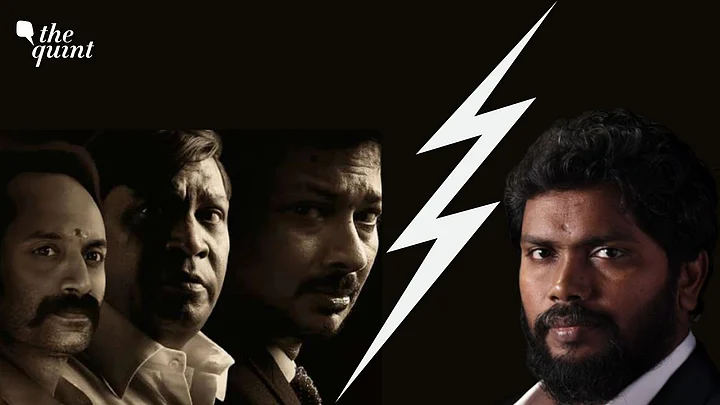The latest Tamil flick, Maamannan, starring Vadivelu, Fahadh Faasil, and Keerthy Suresh (and music composed by AR Rahman) is directed by Mari Selvaraj of Pariyerum Perumal and Karnan fame. The film has garnered widespread appreciation for its thought provoking portrayal of caste discrimination against Dalit leaders within political parties in Tamil Nadu.
While the film has received praise from audiences and critics alike, it has been mired in controversy after Selvaraj’s debut film’s producer and filmmaker, Pa Ranjith, who is also known for his socially conscious films, commented about Maamannan.
What Is the Politics That ‘Maamannan’ Speaks Of?
The plot of Maamannan revolves around an MLA from an oppressed caste who faces discrimination from members of his own political party, which claims to champion social justice. The film is hailed for its relevance in the Tamil Nadu political space as it criticises major Dravidian parties, which claim to be rooted in social justice but are widely known for their shortcomings in addressing the concerns of Dalits.
Why Pa Ranjith’s Statements Drew Flak From DMK Supporters
Filmmaker Pa Ranjith lauded Maamannan and highlighted the significance of its political message. In response to the film's critique of casteism, Ranjith expressed hope that the film's star, actor-producer, and TN minister, Udhayanidhi Stalin, will take concrete steps to address caste-based discrimination within his party, the DMK, which is in power in Tamil Nadu.
Ranjith took to Twitter to underscore the film's central theme, highlighting the discrimination faced by Dalit MLAs even within political parties that advocate for social justice. He raised pertinent questions about the actual power held by MLAs from reserved constituencies, the reasons for their reluctance to voice the concerns of Dalits, and the silence on caste prevalent among social justice-oriented political parties.
Ranjith criticised the fact that the film's narrative resonates with audiences familiar with the DMK's promise of social justice, presenting a scathing commentary on the party's failure to tackle caste-based bias within its ranks.
Ranjith's tweet positions Maamannan as a response to these pressing issues. However, his remarks drew a backlash from DMK supporters on Twitter.
Actor and DMK Minister Udhaynidhi Stalin’s Response
However, Udhayanidhi Stalin took to Twitter to address the concerns raised by Ranjith, emphasising the DMK's commitment to eradicating caste-based oppression and hierarchies not only within their party but across all political organisations.
Udhayanidhi referenced the DMK's historical contributions to the ideology of social justice in the iconic 1952 film Parasakthi, which was written by ex-chief minister Dr M Karunanidhi. He highlighted the continuous efforts of the party from that time to the release of Maamannan to use culture to propagate the concept of social justice.
"It (Social Justice) is a century-old struggle for equality against a thousand-year-old sanatana. An unfinished struggle too. We all know that a single film cannot bring about a revolution in society. Following the foot steps of Periyar and Ambedkar, this change can be made by constantly interacting with people along the way. We will all travel together towards that. Thanks to brother Ranjith who now has faith in the party and me in this journey."Udhayanidhi Stalin
Udhayanidhi acknowledged the persistent fight against social inequality and the need for collective efforts to transform society. He stressed the importance of following in the footsteps of reformers like Periyar and Ambedkar, who championed the cause of equality. Udhayanidhi expressed gratitude to Ranjith for his trust in both him and the DMK, recognising the shared goal of societal transformation. Responding to Udhaynidhi Stalin, Ranjith said that he was happy to embark on a journey together.
Is the Controversy Around Maamannan a Healthy Debate for TN Politics?
Mari Selvaraj's directorial serves as a significant cinematic critique of caste discrimination within political parties. It highlights the urgency of addressing systemic biases and striving for inclusive governance.
Maamannan and the ensuing discourse surrounding it shed light on the persisting issue of caste discrimination within political parties. The film’s critique, along with Ranjith's and Udhayanidhi's conversation on Twitter, underscore the ongoing struggle for social justice and the need for collaborative action to achieve a more equitable society. It opens up avenues for reflection and calls for concrete actions to combat caste-based biases in politics and society at large.
